Services on Demand
Article
Indicators
Related links
-
 Cited by Google
Cited by Google -
 Similars in Google
Similars in Google
Share
South African Journal of Education
On-line version ISSN 2076-3433
Print version ISSN 0256-0100
S. Afr. j. educ. vol.36 n.1 Pretoria Feb. 2016
http://dx.doi.org/10.15700/saje.v36n1a627
Evaluating the effectiveness of a metacognitive programme for disadvantaged learners in the Foundation Phase
Louis Benjamin
Schools Development Unit, University of Cape Town, South Africa. louisben@iafrica.com
ABSTRACT
Learners in South Africa lag behind in literacy and numeracy skills relative to their peers in other countries. This is ascribed to a lack of quality education in the preschool and Foundation Phases of schooling, and conditions related to poverty. The Basic Concepts Mediated Learning Programme (BCMLP) aims to promote the conceptual development of young children through training teachers to be mediators in a metacognitive educational programme. The BCMLP was implemented in the Foundation Phase (Grade R to Grade 3) in two schools in impoverished areas of the Northern Cape over three years (20082010). Baseline testing found that children at both schools experienced significant delays in their conceptual and scholastic development. After being trained as mediators, teachers implemented this approach with groups, eventually integrating it into the curriculum. There was variable continuity of implementation at the two schools, with one school only implementing the programme for the first year. The conceptual development and scholastic functioning of learners were monitored pre-intervention to post-intervention. Results found that implementation of the programme was consistent with considerable improvements in conceptual and scholastic functioning. Further, improvements were more pronounced, where the programme was implemented continually for three years. The researcher concluded that the programme made a positive impact on participating learners' knowledge and understanding of basic conceptual systems and scholastic functioning.
Keywords: basic concepts; concept teaching; conceptual development; mediated learning; metacognitive programme
Introduction
The massification of education in South Africa since the advent of democracy has led to increased access to education, bringing many more learners into the system. However, research has indicated that South African students continue to lag behind in the development of literacy and numeracy skills (Meier, 2011; The Southern and Eastern Africa Consortium for Monitoring Educational Quality (SACMEQ), 2010).
Deficiencies in numeracy and literacy are often ascribed to lack of good quality education in the preschool years, and Foundation Phase of education. It is noted that many children in South Africa do not attend Grade R. As a result, learners start school without the necessary prerequisites for formal school learning, and this is a major cause of school failure and dropout (Rossi & Stuart, 2007; Van Zyl, Le Roux & Van Rensberg, n.d.).
Poverty experienced by many children in South Africa has also been noted to be associated with learning delay. International studies have indicated that children at age four who live below the poverty line are 18 months below what is considered normal for their age group, and that by age 10, gaps remain present (Layzer, 2011).
Theoretical Perspectives on Conceptual Development
Concepts are the mental categories that help us to classify phenomena, such as objects, events and ideas. Conceptual development in children involves a series of cognitive processes including perception, identification of similarities and differences, ordering, classifying and generalisation (Akman, Gpek & Uyanik, 2000). The transition from perception to concept is a transition from experience that is sensory, concrete and individual to that which is mental, abstract, and general (Davydov, 1990).
There is broad agreement that conceptual development is the sine qua non of cognitive development in children (Bruner, Goodnow & Austin, 1967). In fact, the work of three of the most acclaimed cognitive educational theorists (Piaget, Vygotsky and Feuerstein) were mainly concerned with detailing the developmental processes whereby children shift from concrete representations towards more abstract/symbolic forms of representations.
Piaget described the development of cognitive structures in the infant, which are "patterns of physical or mental actions that underlie specific acts of intelligence and correspond to stages of child development" (Benjamin, 2005:20-21). He argued that we are not born with a fixed set of cognitive structures. Nor are they passively absorbed. Rather, they are a continuously developing system of self-regulating structures that are transformed by the child' s interaction with the environment. Vygotsky viewed human development as being dependent on the child's biological readiness to learn during 'sensitive periods', and on mastery of 'symbolic mediators' i.e. concepts, their appropriation and internalisation in the form of inner psychological tools (Kozulin, 2002). Vygotsky argued that the acquisition of spontaneous and scientific concepts is fundamentally different, and that the acquisition of scientific concepts is built on the foundation provided by spontaneous concepts, with a complex pattern of interaction between them (Minick, 1987). He also argued that the development of scientific concepts advances the development of everyday concepts (Vygotsky, 1986).
Vygotsky posited that the key to the development of scientific knowledge is the verbal collaboration between teacher and the child in unpacking word meanings and understanding the relationship between words. A focus on theoretical concepts to stimulate deep understanding is achieved through a theoretical learning approach, which is based on learners' acquisition of methods for scientific analysis in different subjects. Each method is aimed at selecting the essential characteristics of objects in the form of symbolic and graphic models. These methods serve as cognitive tools to mediate the learners' further problem-solving (Kozulin, Gindis, Ageyev & Miller, 2003).
Feuerstein (1970) contended that the root of both development and learning is cognitive modi-fiability, i.e. the unique capacity for change in terms of a variety of cognitive and motivational functions, and the ability to adapt to changing demands in life situations (Feuerstein, R & Feuerstein, S 1991). Feuerstein also expanded on the role of the human mediator in cognitive development (Feuerstein, 1970; Feuerstein & Jensen, 1980; Feuerstein, Jensen, Hoffman & Rand, 1985; Feuerstein, Rand & Hoffman, 1979). He contended that a lack of mediated learning experience would result in the deficit of fundamental prerequisites for learning (Feuerstein, R & Feuerstein S, 1991), contending that the transition from a concrete to abstract level of mental functioning requires the active interposition of a mediator whose intentions are marked by a goal that transcends the immediacy of the interaction.
Feuerstein's work led to the development of the mediational teaching style (Haywood, 1993) where human and symbolic interactions of the teacher (mediator) with learners are emphasised. This approach is integral to metacognitive education programmes, where children are required to become reflective and conscious of their thinking processes (Karmiloff-Smith, 1993). A meta-ana-lysis of 55 thinking skills programmes in the UK found that there is powerful empirical evidence that thinking skills interventions can be highly effective at all levels, but especially if they are directed at metacognition, self-regulation and value-grounded thinking (Moseley, Baumfield, Higgins, Lin, Miller, Newton, Robson, Elliott & Gregson, 2004).
The Basic Concepts Mediated Learning Programme (BCMLP)
The BCMLP (also referred to as the Basic Concepts Programme) is a metacognitive programme for young learners in the Foundation Phase of the education system, from Preschool to Grade Three (Benjamin, 2005).
The BCMLP addresses the needs of a diverse learner population, which experiences a range of barriers to learning. These may be learners who have deficits in their knowledge base, who require cognitive enrichment, or who are not making progress in school.
The programme progressively introduces learners to hierarchically constructed knowledge domains or conceptual systems (Fig. 1) that provide a template for a series of thinking activities or cognitive functions (Fig. 2). The ultimate purpose is to assist learners in applying and transferring knowledge of the programme content into daily interactions, to solve higher order problems and facilitate school learning. This is achieved through highly structured mediational encounters, where words are mediated as names of concepts belonging to superordinate (scientific) and subordinate (spontaneous) classifications. For example, mediators of the BCMLP would refer not only to the subordinate concepts yellow and blue in the conceptual domain of colour, but to the colour yellow and the colour blue (the superordinate concept in association with the subordinate concept). The transformation of words into members of classes and conceptual systems requires reorganisation and adaptation of the thinking structures in learners.

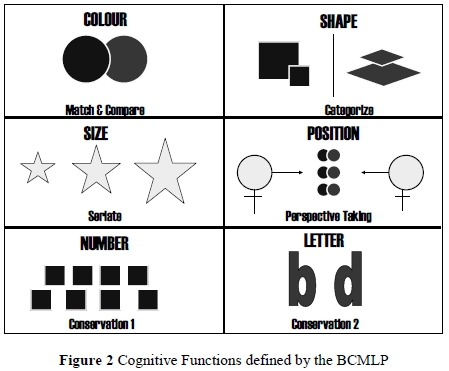
The programme has four procedures, which provide an operational framework for teachers who implement the programme. These are: i) medi-ational teaching; ii) concept teaching; iii) vocabulary teaching; and iv) teaching, to enhance information-processing. These procedures direct the teachers' approach, attitudes, and relationships with learners and their use of conceptual language, while working within a structured concept-teaching model. The provision of frequent observation and feedback to teachers is an integral aspect of the programme (Benjamin, 2005:120).
Context of Implementation of the BCMLP The BCMLP was implemented at Eureka and Lowryville Intermediate Schools in Noupoort and Colesberg, respectively, in the Northern Cape Province of South Africa.
Educational levels in the Northern Cape are low. The 2010 South African National Systemic Evaluation found that Grade Six learners in the province scored an average of 12.75% for Literacy and 24.20% for Numeracy (Province of the Northern Cape Education, 2010).
The primary economic activity is agriculture, which is the largest employer of local people. The percentage of employed people within the age group of 15-65 is approximately 40% (Rangasami, Mouton, De Waal, Coetzer, Phillips & Richter, 2009). As a result, there is a high level of poverty in the area.
Noupoort is an old railway town, which has suffered from the demise of railway traffic, and there are high levels of unemployment in the area. Colesberg has more employment opportunities related to business tourism. It also has more schools. According to Rangasami et al. (2009) there is great dependence on government grants in both towns: 59% of families at Lowryville (Colesberg) and 98% at Eureka (Noupoort) receive government grants. Both schools are located in "Coloured" townships where most of the children live.
Children at Eureka and Lowryville Intermediate Schools experience several barriers to learning. Owing to high levels of poverty and unemployment, few families are able to afford school fees. According to a nurse employed by the project, there are high levels of alcoholism and malnutrition in both communities (Echart, 2009).
Eureka had strong management, with teachers feeling supported by the principal and an efficient administration. At Lowryville, there was a significant amount of instability in terms of both leadership and management.
The teachers at both schools had an average of three years of post-matriculation training. On average, teachers had 25.3 years of experience, with teachers from Eureka having on average five years more experience than their colleagues from Lowryville.
Tables 1 and 2 indicate the number of teachers and learners who participated in the programme between 2008 and 2010.


There was a high level of consistency in the number of learners in each grade at both schools during the project, with the exception of Grade One, which had approximately 14% more learners than Grades Two and Three. This was due to the fact that more learners were retained in Grade One each year. There were approximately 100 more learners in the Foundation Phase at Lowryville compared to Eureka.
Overall, there were high levels of teacher stability at both schools during the project. With the exception of one teacher from Eureka, who joined the project in the last year, all teachers had three or more years of project experience.
Teachers' attitudes toward the programme led to differences in its implementation: whereas teachers in all grades of the Foundation Phase at Eureka implemented the programme consistently for the project's duration, the programme was implemented sub-optimally at Lowryville, owing to disruptions in teacher participation. At Lowryville, Grade Two and Grade Three teachers refused to continue with the programme from the start of 2009. Teachers in Grade R and Grade One implemented the programme and the associated interventions for the project's duration, but were not monitored from 2009, because of a decision by school management that prevented the project team from doing class visits. The schools were severely affected by the Public Servants strikes of 2010, with Lowryville being more severely impacted.
The intention of the intervention was not to differentiate between the schools. However, the circumstances in which the interventions took place allow for the posing of questions regarding the relative contribution of the programme towards scholastic performance and knowledge of basic concepts. By means of obtaining baseline data of children's abilities in basic concepts and general scholastic areas at Eureka and Lowryville schools, respectively, and by administering subsequent annual assessments for the duration of the project, the project leader was able to explore the following questions: 1) do children in the Foundation Phase with significant developmental delays at the start of schooling make advances in conceptual reasoning and school achievement through an appropriate metacognitive programme and related teacher-mediated classroom activities?; and 2) have learners who have participated in the programme from Grades 1-3 (Eureka) benefitted more than those who have participated for only one or two years (Lowryville)?
Overview of the Intervention
The aim of the intervention programme was to:
- promote an understanding of basic conceptual systems;
- develop receptive and expressive language abilities;
- encourage the use of problem-solving in order to promote reasoning and logical thought;
- promote teaching-learning methods that were intentional, interactive and in which dialogue was encouraged (mediational teaching); and
- assist teachers to recognise prior learning (e.g. conceptual knowledge) and to encourage transfer of knowledge to establish new conceptual systems (viz. number and letter) required for school learning.
The project took place over a three-year period and comprised three phases, moving from initial teacher training to extended generalisation of learning into teaching practice.
Phase 1: Training
Teacher training took place in June 2007 and January 2008. The training lasted five days and was conducted by the project leader, who trained 28 participants from the project schools and six officials from the Northern Cape Department of Education (NCDOE).
The purpose of the training was to prepare Foundation Phase teachers at the project schools to become mediators of the BCMLP. The training comprised both theoretical and experiential components. The teachers were also trained to apply a screening tool (Test of Basic Concepts Knowledge) which allowed them to make inferences about the cognitive functioning of the class, group the learners according to ability and refer very weak learners for intervention.
For the duration of the project, the project leader visited the project schools three times per year. The purpose of the visits was to provide leadership and guidance to project participants, train teachers, monitor teaching and learning, support the implementation of the programme, and provide on-going assessment of children's basic concepts knowledge and scholastic abilities.
In this phase, teachers were expected to apply the programme differentially according to the learners' level: Grade R teachers were to implement the programme daily, with all their learners, as a developmental curriculum. However, the main thrust for Grade 1-3 teachers was to implement the programme for intervention purposes only by grouping children according to their needs.
The Project Assistant visited each teacher (Grade R-3) twice per term for the duration of the project. This support provided the platform for teachers to share their concerns and facilitated the integration of the programme's objectives into teaching practice through feedback and observation. Support from the NCDOE was discontinued from 2009.
Phase 2: Generalisation
Phase 2 took place in 2009. During this phase, teachers were expected to apply their newly acquired knowledge about the mediated teaching approach to their general teaching practice, through literacy and numeracy activities, for which a structure was provided. In 2009, the teachers were expected to make explicit connections between the programme and the curriculum.
All classes were divided by their teachers into three developmental groupings. The intervention therefore targeted not only those learners perceived to be weak, but provided differentiated programmes for the entire class. The intervention programmes were reinforced and extended each year.
During this phase, the BCMLP was considered the central organising instrument that allowed the development of a common language and approach between teachers. It also provided teachers with a way to determine the baseline language and conceptual competencies of their learners.
Phase 3: Extension of generalization
Phase 3 took place in 2010. In this phase, the BCMLP continued to be implemented for Grade R to Grade Three. Teachers were expected to become more independent and competent in their teaching as they continued to combine the mediated teaching approach with their current teaching approaches.
Overview of Study
Target population
All learners in Grade R to Grade Three at both project schools participated in the study from 2008 to 2010). The total number of learners was 785 in 2008, 774 in 2009, and 801 in 2010.
Data collection tools
The assessment tools focused on the acquisition of specific knowledge as it relates to the development of cognitive structures. It is proposed that assessment of scholastic functioning provides insight into the cognitive development of the learners. The relationship between basic concept knowledge and school achievement has also been supported by numerous studies (De Nason, 1986; Piersel & McAndrews, 1982; Steinbauer & Heller, 1978).
Data collection tools measured scholastic ability and understanding of basic concepts. The Scholastic Battery consisted of:
1) UCT Graded Spelling Test: a norm-based test developed for learners in the Western Cape (Administered to Grade One-Four learners).
2) UCT Graded Reading Test: a norm-based test developed for learners in the Western Cape (Administered to Grade One-Four learners).
3) Ballard One-Minute Test (Addition & Subtraction): a norm-based test developed for learners in the Western Cape.
The Basic Concepts Assessment consisted of:
1) Boehm Test of Basic Concepts - Revised (Boehm-R, Boehm, 1986): a test developed to assess the understanding of 50 high frequency basic concepts in young learners (Administered to Grade One-Four learners). This is a norm-based test but direct reference was not made to the American derived norms. Rather, reference was made to local norms that had been developed through the researcher's fieldwork and experience with this test in South Africa (2004-2009).
2) Test of Basic Concepts Knowledge (Benjamin, 2005). This is a screening test designed for assessment of the understanding of basic concepts. It was designed by the researcher for the assessment of Grade 1 learners. Some validity data on the test has found it to be a predictor of scholastic performance of Grade One learners (Benjamin, 2009a, 2009b).
With the exception of the UCT Graded Reading Test, testing was done in a group format where standardised instructions were given to the group. The Graded Reading Test was administered individually. The test battery took approximately 90 minutes to administer. The test battery was only administered to Grade One-Three learners as parts of the battery were only normed for these years.
The accuracy of the test results was verified by comparing with teacher evaluations of their learners' performance at the end of each year. There were high levels of researcher-teacher agreement in these evaluations.
Data collection
Testing was done by the researcher and his assistant. Baseline data was gathered at the end of 2007 from a randomly selected sample of 30 Grade Three learners (15 from each school) who had not received intervention. The scholastic battery and Boehm-R were used for this purpose (Baseline 1). The sample comprised 13% of the Grade Three population at the project schools. These baseline scores were used to make comparisons with the learners in Grade Three at the end of the project. In addition, the basic concept knowledge of all Foundation Phase learners at both schools (n = 619) was screened using the Test of Basic Concepts Knowledge pre-intervention in 2008 (Baseline 2) and at the beginning of 2009 and 2010.
At the end of 2008, 2009 and 2010 a sample of 30 learners was randomly selected for testing in each grade at each school using the same test battery. This was with the exception of Grade Three learners in 2008. This represented approx.-imately 30% of the population in the Foundation Phase at the project schools. The size of this sample was therefore adequate from the perspective of being representative of the population (De Vos, Strydom, Fouché & Delport, 2002).
Data analysis and interpretation of data
After data was collected from the battery of standardised tests, the mean scores were compared with the norm scores of the tests administered. In the case of the Boehm-R and the Test of Basic Concept Knowledge, results were compared with mean scores that the researcher had derived from extensive use of the tests in South Africa since 2005 (Benjamin, 2012).
The results are discussed in terms of trends and patterns of differences between learners during the project relative to baseline results. Learners from the same grade are compared each year e.g. Grade Ones of 2008 with the Grade Ones in 2009 and 2010. The results from both of the schools are reported individually and the trends from each of the schools are compared. The researcher was particularly interested in the results of the Grade Three learners at the end of the project. These learners had received intervention since the start of the project when they were in Grade Three.
Results
The baseline results are presented followed by the post-intervention results from Grade One to Grade Three. Results are discussed in terms of scholastic skills and basic concepts knowledge. The results are presented separately for each school (with the exception of the Grade Three baseline).
Baseline Scores
Baseline 1: Scholastic and basic concepts assessment - 2007
The baseline scholastic tests for Grade Three yielded mean scores that were significantly below the norm in all areas assessed. Addition and subtraction was on a Grade One level, while reading and spelling was on a Grade Two level. Only 10% of the learners were functioning on or above grade level. Learners from Eureka were found to be marginally stronger (approximately two mean points per area assessed) in all areas.
For basic concepts, the Grade Three learners were functioning 3.5 mean points below norm. The mean score at Eureka was slightly higher (2.7 points below norm) than at Lowryville.
Baseline 2: Test of basic concepts knowledge grade 1-3 2008
Results indicated that the majority of learners in the Foundation Phase were not prepared for learning at Grade One level. Only 29.2% of Grade One learners were functioning at Grade level and 31.4% and 41.7% of Grade Two and Three learners respectively were functioning in the range expected of a well-prepared Grade One learner. There were small differences between the schools, which equated to an average 0.7 mean point difference in the scores in favour of Eureka, when each grade was compared. Figure 3 indicates the baseline mean Knowledge of Basic Concept Scores of Grade One-Three learners in 2008.
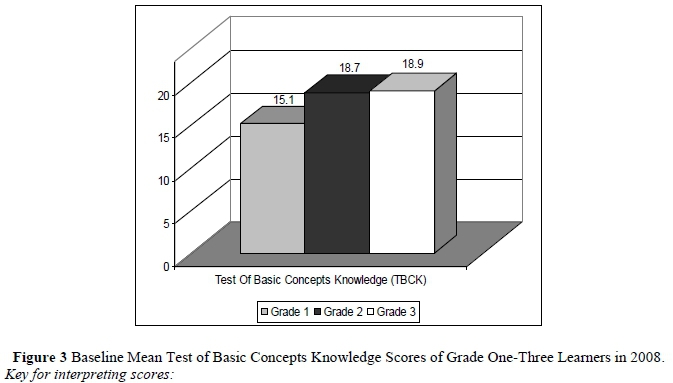
Study Results
Scholastic results
Figure 4 compares mean scholastic scores of Grade One learners from 2008 to 2010. The results indicate that the scholastic scores at Lowryville and Eureka improved by 32% and 72%, respectively. At the end of 2010, it was found that 73% (n = 44) of learners could proceed to Grade Two (some with support). This was a 35% improvement on the number of learners who could progress to Grade Two in 2008.
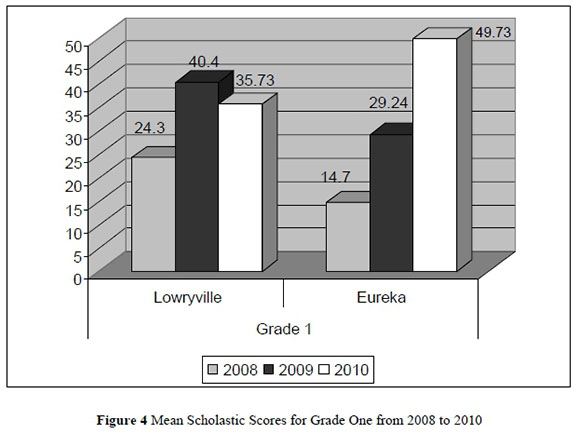
However, scholastic scores at Eureka increased more than those at Lowryville. Scores at Eureka were on or above grade level in three of the four scholastic areas tested (subtraction, spelling and reading), while those at Lowryville were on or above grade level in one of the four areas tested (reading). While improvements of scores at Eureka were incremental, the results at Lowryville were more erratic. Figure 5 compares the mean scholastic scores of Grade Two learners from 2008 to 2010.
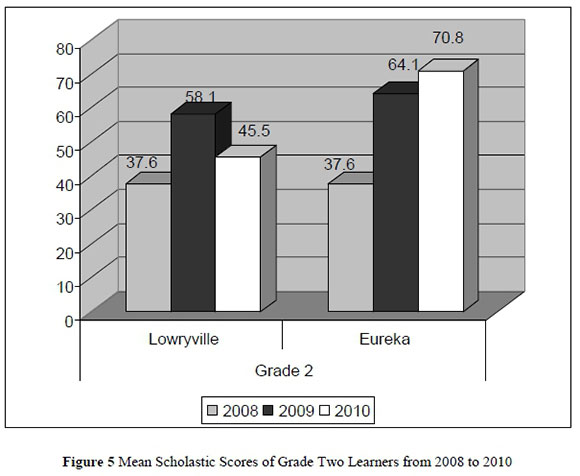
For Grade Two learners, scholastic scores at Eureka increased more than those of learners at Lowryville (47% and 17% respectively). Scores at both schools were however below grade level in three of the four scholastic areas assessed, the exception was the mean reading scores which were on or above grade level. While the improvements of Eureka scores were incremental, the results at Lowryville were irregular over the years.
It was found that 38% (n = 23) of learners could proceed to Grade Three in 2010 (some with support). This was a 21.7% improvement on the total number of learners who could progress to Grade Three in 2008. Figure 6 compares the mean scholastic scores of Grade Three learners from 2007, 2009 and 2010.
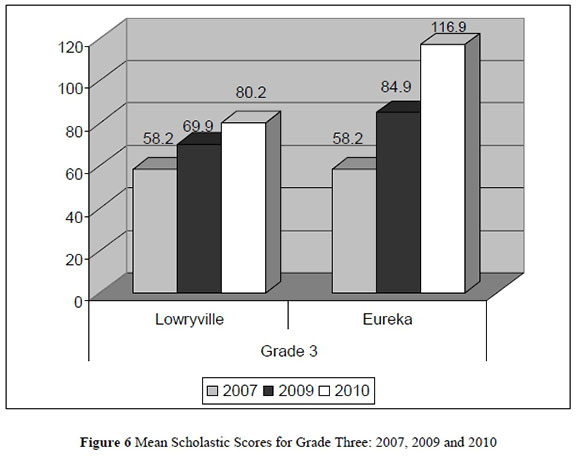
Scholastic improvement was more evident at Eureka than at Lowryville. The results indicate that scholastic performance of Grade Three learners improved by 50% at Eureka and 27% at Lowryville relative to baseline. The mean scores of Eureka learners were on or above grade level in one of the four scholastic areas tested (reading) whereas scores at Lowryille were below grade in all areas tested. Figure 7 compares pre and post test mean scores of learners in Grade Three at both schools.
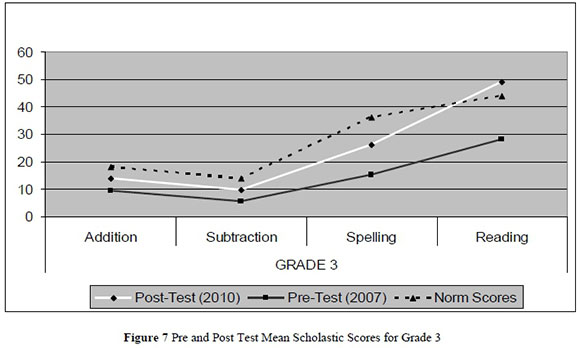
The cumulative scholastic score for all project learners increased by 40.2 mean points from pre- to post-intervention. These gains were associated with improved scholastic mean scores: Addition: 4.3 points; Subtraction: four points; Spelling: 11 points ; Reading: 20.9 points (Fig. 7). It was found that 53% (n = 32) of learners could proceed to Grade Four in 2010, some requiring support. This was a 33% improvement on the number of learners who could progress to Grade Four in 2007. Figure 8 compares the mean Boehm-R scores of Grade One and Two learners at both schools from 2008 to 2010.
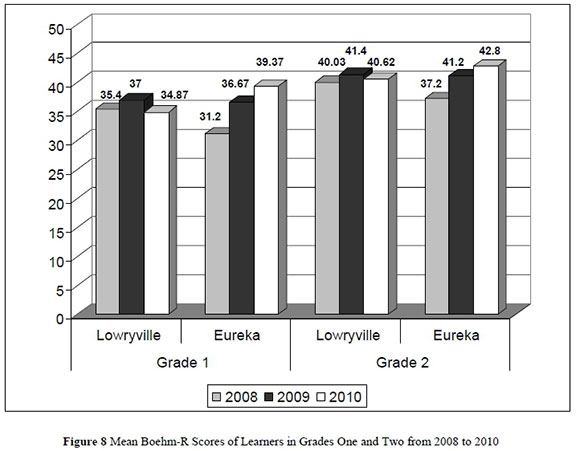
By 2010, Grade One Boehm-R scores at Eureka had improved by 8.17 mean points (21%), 1.37 points above the norm. However Grade 1 scores at Lowryville declined by 0.53 points (1.5%) to 4.87 points below the norm.
Boehm-R scores for Grade Two learners at Eureka and Lowryville changed by 5.6 (13%) and 0.59 (1.5%) mean points, respectively, over the duration of the project. While the mean score at Eureka was .80 points above norm by the end of the project, learners from Lowryville were functioning 1.38 points below norm on average. Figure 9 compares the mean Boehm-R scores of Grade Three learners at both schools in 2007, 2009 and 2010.
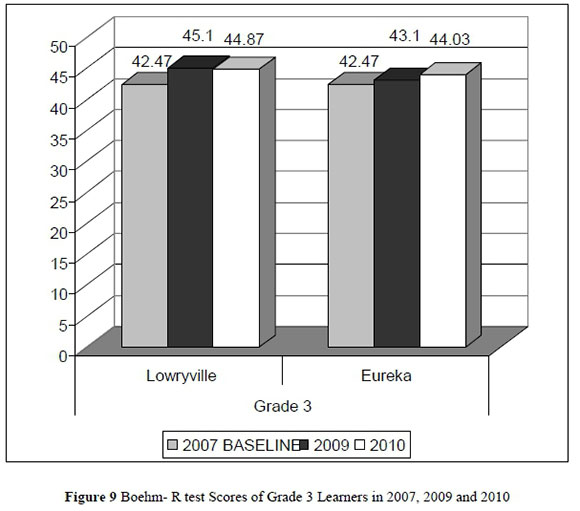
By 2010 basic concept scores of Grade Threes at Eureka and Lowryville had improved by 1.6 and 2.4 mean points respectively (5.3% and 3.5%) relative to baseline. However, learners from both schools were still functioning 1.55 points below norm on average.
Discussion
The study sought to determine whether children in the Foundation Phase with significant developmental delays at the start of schooling make advances in conceptual reasoning and school achievement through an appropriate metacognitive programme and related teacher-mediated classroom activities.
Results indicated that by the end of the project, many learners who had started the project in Grade One in 2008 with significant delays, had made considerable improvements on tests of conceptual reasoning and scholastic functioning.
When viewed against the Annual National Assessment (ANA) results of Northern Cape Province, where 34% of Grade Three learners attained scores of 50% or higher for Literacy and 22% attained scores of 50% and higher in Numeracy (Department of Basic Education, Republic of South Africa, 2010), the results of Eureka learners appear noteworthy. At Eureka, where the programme was implemented continually, scholastic and basic concept scores improved year on year for each grade. It is contended that the improved performance of Foundation Phase learners during the project could be attributed, in the main, to the teaching interventions received during the project. The finding is consistent with earlier research, which showed that the BCMLP made significant improvements to cognitive and scholastic functioning of Foundation Phase learners (Benjamin 2005, 2006, 2009c) from disadvantaged backgrounds.
The intention at the start of the project was not to conduct a comparative study between Lowryville and Eureka. However, compromised circumstances at Lowryville led to the programme being implemented sub-optimally after the first year. In Grade One there was also a lack of classroom mentoring and support compared to Eureka. The divergent circumstances at the schools and the disparate results allow one to conclude that the mediated learning metacognitive programme had a positive effect on learners' scholastic ability, and basic concept knowledge, by changing teachers' approaches towards teaching and understandings of how their learners learn. The effect was greater at Eureka, where the programme was implemented for the duration of the project.
Whereas the baseline study found few differences between the schools at the start of the project and a sizeable advantage for learners at Lowryville in Grade One after the first year of implementation, the final project results indicated that Grade Three learners from Eureka attained higher scores in all areas when compared with their peers at Lowryville.
Because most of the teachers at Eureka had received on-going classroom mentoring as well as practice for three years, it is likely that they had internalised the mediational teaching approach to a greater degree and that teacher experience in this approach was responsible for increased (grade) scores over the years. This is resonant with Feuerstein's theory, which proposed the role of the human mediator as primary in creating modi-fiability. Conversely, it is evident that an environment that does not support a processed-based participatory approach can impede an attempted transition from a traditional teaching model (Grosser, 2007). However, the focus of the current study was on learner performance and not teachers, and this area would need to be explored in future studies.
The main theoretical contention of the study was that improvements in the scholastic results would occur alongside improvements in conceptual reasoning. The results generally support this contention. For example, the study results found that where learners' scholastic results had improved progressively year on year, parallel and consistent improvements were also noted in their Boehm-R results. Such results were more evident in the learners at Eureka, than the learners at Lowryville. It may be inferred that improvements found in the Grade One learners at the end of the project would be predictive of their future level of scholastic functioning if teachers were to continue with implementation of metacognitive approaches. The internalisation of the mediational teaching approach and the introduction of a concept teaching approach, would thus be regarded as necessary in order for results to improve.
In conclusion, the study demonstrated that learners from disadvantaged environmental and educational backgrounds who were given opportunities for higher order, conceptual learning linked to the school curriculum made substantial progress in their academic development. It is contended that further emphasis on the educational interventions introduced during this project would result in the strengthening of their school learning in later years. A future follow up study would be needed in order to validate this contention.
Acknowledgement
We would like to thank the UK Big Lottery Fund and Hantam Community Education Trust for funding and supporting this research.
References
Akman B, Gpek A & Uyanik G 2000. Examination of the conceptual development of children at six years of age attending kindergarten. International Journal of Early Years Education, 8(3):227-234. doi: 10.1080/09669760050156767 [ Links ]
Benjamin L 2005. The development and evaluation of a metacognitive programme for young learners in the South African Context. Unpublished PhD thesis. Bellville: University of the Western Cape. [ Links ]
Benjamin L 2006. Mediating the language of farm school children in the Foundation Phase. Presentation for Douglas Murray Education Trust, Cape Town, South Africa. Available at http://www.basicconcepts.co.za/news-events/news/hantam-community-education-trust-project-outcomes. Accessed 27 February 2011. [ Links ]
Benjamin L 2009a. Grade 1 Results: Metro Central Education District. Western Cape Department of Education. Available at http://www.basicconcepts.co.za/sites/default/files/current/CENTRAL%20RESULTS%20FOR%20GRADE%201.pdf. Accessed 27 February 2011. [ Links ]
Benjamin L 2009b. Grade R Results: Metro South Education District. Western Cape Department of Education. Available at http://www.basicconcepts.co.za/sites/default/files/current/GRADE%20R%20RESULTS%202009.pdf. Accessed 27 February 2011. [ Links ]
Benjamin L 2009c. Mediated learning in village schools in the Namaqua district. International Association for Cognitive Education in Southern Africa, International Conference, February, Cape Town, South Africa. Available at http://houtbay.typepad.com/files/kamiesberg-results.pdf. Accessed 27 February 2011. [ Links ]
Benjamin L 2012. Test of basic concepts knowledge. Grade 1 test results: Multi-year basic concepts projects. Available at http://www.basicconcepts.co.za/news-events/news/basic-concepts-programme-grade-1-results-9-multi-year-projects. Accessed 26 June 2013. [ Links ]
Boehm AE 1986. Boehm Test of Basic Concepts - revised (BTBC-R). San Antonio, TX: Harcourt Brace & Company. [ Links ]
Bruner JS, Goodnow JJ & Austin GA 1967. A study of thinking. New York: Science Editions. [ Links ]
Davydov VV 1990. Soviet studies in Mathematics education (Vol. 2). Types of generalization in instruction: Logical and psychological problems in the structuring of school curricula. Reston, VA: National Council of Teachers of Mathematics. Available at https://www.marxists.org/archive/davydov/generalization/generalization.pdf. Accessed 21 December 2015. [ Links ]
De Nason FOC 1986. Systematic instruction of basic relational concepts: effects on the acquisition of concept knowledge and of language and mathematics achievement of Puerto Rican first graders from low income families. Unpublished doctoral thesis. New York, NY: Teachers College, Columbia University. [ Links ]
Department of Basic Education, Republic of South Africa 2010. Report on the national annual assessments of 2011. Pretoria: Department of Basic Education. Available at http://www.education.gov.za/LinkClick.aspx?fileticket=%2B6A7GNX%2Fk6o%3D&tabid=358&mid=1325. Accessed 3 February 2016. [ Links ]
De Vos AS, Strydom H, Fouché CB & Delport CSL 2002. Research at grass roots: For the social sciences and human services professions. Pretoria: Van Schaik Publishers. [ Links ]
Echart M 2009. Outreach health report: For the Northern Cape Department of Education. De Aar, SA: Northern Cape Department of Education. [ Links ]
Feuerstein R 1970. A dynamic approach to causation, prevention and alleviation of retarded performance. In HC Haywood (ed). Social-cultural aspects of mental retardation. New York: Appleton-Century- Crofts. [ Links ]
Feuerstein R & Feuerstein S 1991. Mediated learning experience: A theoretical review. In R Feuerstein, PS Klein & AJ Tannenbaum (eds). Mediated learning experience (MLE): Theoretical, psychosocial and learning implications. London: Freund Publishing House Ltd. [ Links ]
Feuerstein R & Jensen MR 1980. Instrumental enrichment: Theoretical basis, goals, and instruments. The Educational Forum, 44(4):401-423. doi: 10.1080/00131728009336184 [ Links ]
Feuerstein R, Jensen MR, Hoffman MB & Rand Y 1985. Instrumental enrichment, an intervention programme for structural cognitive modifiability: theory and practice. In JW Segal, SF Chipman & R Glaser (eds). Thinking and learning skills: Relating instruction to research (Vol. 1). Hilldsdale, NJ: Lawrence Erlbaum Associates. [ Links ]
Feuerstein R, Rand Y & Hoffman MB 1979. The dynamic assessment of retarded performers: The learning potential, assessment device, theory, instruments and techniques. Baltimore: University Park Press. [ Links ]
Grosser M 2007. Effective teaching: Linking teaching to learning functions. South African Journal of Education, 27(1):37-52. [ Links ]
Haywood HC 1993. A mediational teaching style. International Journal of Cognitive Education and Mediated Learning, 3(1):27-38. [ Links ]
Karmiloff-Smith A 1993. Self-organization and cognitive change. In MH Johnson (ed). Brain development and cognition: a reader. Oxford: Blackwell. [ Links ]
Kozulin A 2002. Sociocultural theory and the mediated learning experience. School Psychology International, 23(1):7-35. doi:10.1177/0143034302023001729 [ Links ]
Kozulin A, Gindis B, Ageyev VS & Miller SM 2003. Vygotsky's educational theory in cultural context. Cambridge: Cambridge University Press. [ Links ]
Layzer JI 2011. Project upgrade in Miami-Dade County, Florida, 2003-2009. Cambridge, MA: Abt Associates. [ Links ]
Meier C 2011. The Foundations for Learning Campaign: helping hand or hurdle? South African Journal of Education, 31(4):549-560. Available at http://sajournalofeducation.co.za/index.php/saje/article/viewFile/432/273. Accessed 26 January 2016. [ Links ]
Minick N 1987. Implications of Vygotsky's theories for dynamic assessment. In CS Lidz (ed). Dynamic assessment: An interactional approach to evaluating learning potential. New York: The Guilford Press. [ Links ]
Moseley D, Baumfield V, Higgins S, Lin M, Miller J, Newton D, Robson S, Elliott J & Gregson M 2004. Thinking skills framework for post-16 learners: an evaluation. A research report for the Learning and Skills Research Centre. Guildford, UK: Learning and Skills Research Centre. Available at http://files.eric.ed.gov/fulltext/ED508442.pdf. Accessed 3 February 2016. [ Links ]
Piersel WC & McAndrews T 1982. Concept acquisition and school progress: An examination of the Boehm test of basic concepts. Psychological Reports, 50(3):783-786. doi: 10.2466/pr0.1982.50.3.783 [ Links ]
Province of the Northern Cape Education 2010. Systemic Evaluation Provincial Report: Foundation Phase. [ Links ]
Rangasami J, Mouton C, De Waal L, Coetzer A, Phillips L & Richter T 2009. Hantam Community Education Trust: Mid-term evaluation of the supportive structures for primary education project. Final report to Hantam Community Education Trust. Available at http://www.basicconcepts.co.za/sites/default/files/current/Hantam%20Trust%20final%20Mid%20term%20evaluation%20report%2009.09.09.pdf. Accessed 26 December 2015. [ Links ]
Rossi J & Stuart A 2007. The evaluation of an intervention programme for reception learners who experience barriers to learning and development. South African Journal of Education, 27(1):139-154. [ Links ]
The Southern and Eastern Africa Consortium for Monitoring Educational Quality (SACMEQ) 2010. South Africa. Available at http://www.sacmeq.org/education-south-africa.htm. Accessed 27 February 2011. [ Links ]
Steinbauer E & Heller MS 1978. The Boehm test of basic concepts as a predictor of academic achievement in grades 2 and 3. Psychology in the Schools, 15(3):357-360. doi: 10.1002/1520-6807(197807)15:3<357::AID-PITS2310150308>3.0.CO;2-6 [ Links ]
Van Zyl E, Le Roux S & Van Rensburg O n.d. The impact of school readiness on school performance. Available at http://www.pmg.org.za/ffiles/docs/100518ufstate_0.rtf. Accessed 27 February 2011. [ Links ]
Vygotsky LS 1986. Thought and language. Cambridge, MA: MIT Press. [ Links ]














